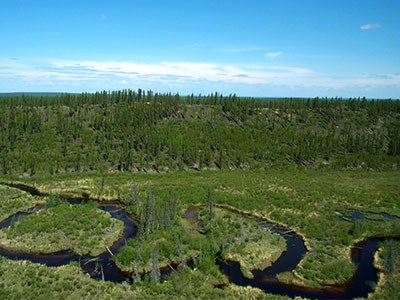The Ontario government and the nine communities of the Matawa First Nations have negotiated a “milestone” framework agreement on how to move forward with mineral and community development in the Ring of Fire.
Webequie Chief Cornelius Wabasse is pleased that an agreement with a process has now been formalized that puts First Nations on an even footing with the Ontario government.
“The framework is all about developing that process on how things are going to roll out and how we want to play a role, how much role we’re going to have, but we want to sit parallel with the government in moving forward.”
His remote fly-in community of 600 is situated is 540 kilometres north of Thunder Bay and just to the west of the Ring of Fire chromite and nickel deposits.
Wabasse has been part of the high-profile negotiations that began last July involving former Ontario premier Bob Rae, the chief negotiator for Matawa, and ex-Supreme Court Justice Frank Iacobucci, Ontario’s lead negotiator.
“It’s a milestone on its own, but still we have to move forward. We have a lot of work yet to be done before we make it into a reality.”
Wabasse said the agreement gives area First Nations “security” that certain issues, critical to the communities, will be addressed and further ensures that area Aboriginal people realize benefits from the mining developments.
“We want grid line transmission, also a (transportation) corridor and community infrastructure all put on the table. But we have a lot of work to do before any of the major developments start in our area.”
To be included in those future talks is how resource revenue sharing will work to share benefits from mining with local First Nations.
In a release, the Ontario government calls the agreement a “first step in a historic, community-based negotiation process” that ensures the province and First Nations will collaborate on issues of regional long-term environmental monitoring, greater participation in environmental assessment processes, resource revenue sharing, economic benefits and area infrastructure.
Exploration and mine development of the high-grade chromite and base metal deposit in the James Bay lowlands have been lagging in the past year.
Among the key challenges has been the lack of infrastructure to reach these stranded mineral deposits: a shortage of skilled labour, the need to finalize agreements with First Nations, and in finding ways to reduce the impact of mining in one of the world’s largest wetlands.
The Ontario government has introduced a Ring of Fire development corporation and has put Deloitte Canada in charge of setting up that structure.
Wabasse said that organization hasn’t yet been discussed, but will be in the months to come.
Wabasse believes this agreement will be the start of a new era of negotiations between industry, government and First Nations in making life better for future generations in the Far North.
“There’s going to be challenges. There’s going to be talk, there’s going to be arguments that we have to face. “I’m grateful that we’re moving forward and we’re working with Ontario and we’re looking forward to making things happen for the future.”




